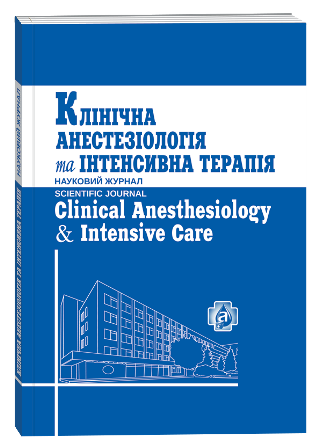DYNAMICS OF SECONDARY PULMONARY HYPERTENSION AFTER CARDIAC SURGICAL PROCEDURES IN PATIENTS WITH LOW LEFT VENTRICULAR EJECTION FRACTION
Keywords:
left ventricular ejection fraction, pulmonary artery systolic pressure, pulmonary hypertension, cardiac surgeryAbstract
Actuality. In cardiac surgical patients with low left ventricular ejection fraction (LVEF) the risk of perioperative complications is enhanced. It is often accompanied with secondary pulmonary hypertension (PH), which heightens risk. Aim. With the purpose of evaluating PH changes after cardiac surgery and its effect on outcomes. Materials and methods. We carried out a retrospective observational study of all 65 patients with LVEF <40 %, operated on in our Centre during 6 months period. Results. All the patients had pulmonary hypertension (pulmonary artery systolic pressure (PASP) of (58.3±13.7) mm Hg). 17 patients had isolated coronary artery bypass surgery, 48 (74%) of 65 patients had complex procedures, involving coronary arteries, heart valve and myocardium, with the use of cardiopulmonary bypass. 40 (61%) patients need complex postoperative management, and 7 (10.7%) patients had been treated in our Institute more than 7 days. The mortality was 3%. Mean PASP decreased significantly upto (48.9±9.1) mm Hg, p<0.05. Our results demonstrate, that surgical repair for severe cardiac diseases in this category of patients is feasible, with acceptable complications and mortality rates, and decreases PH. Conclusions. Further studies for the estimation of the effect of such changes in pulmonary artery systolic pressure on outcomes are warranted.
References
Goto T. Cerebral dysfunction after coronary artery bypass surgery / T. Goto, K. Maekawa // Journal of Anesthesia. – 2014. – Vol. 28 (2). – P. 242–249.
Minimized extracorporeal circulation does not impair cognitive brain function after coronary artery bypass grafting / D. Reineke, B. Winkler, T. Konig [et al.] // Interactive Cardiovascular and Thoracic Surgery. – 2015. – Vol. 20 (1). – P. 68–73.
Дюба Д. Ш. Предикторы ранних когнитивных нарушений у больных в послеоперационном периоде после аортокоронарного шунтирования / Д. Ш. Дюба // Журнал неврології ім. Б. М. Маньковського. – 2013. – № 2 (1). – С. 35–38.
A pilot study of cerebral tissue oxygenation and postoperative cognitive dysfunction among patients undergoing coronary artery bypass grafting randomised to surgery with or without cardiopulmonary bypass / W. F. Kok, A. E. van Harten, B. M. Koene [et al.] // Anaesthesia. – 2014. – Vol. 69 (6). – P. 613–622.
Cognitive dysfunction after cardiac surgery / K. Szwed, M. Bieliński, W. Drozdz [et al.] // Psychiatria polska. – 2012. – Vol. 46 (3). – P. 473–482.
Профилактика неврологических осложнений в сердечно-сосудистой хирургии / Л. А. Бокерия, И. Ю. Сигаев, Н. А. Дарвиш [и др.] // Журнал неврології ім. Б. М. Маньковського. – 2013. – № 2 (1). – С. 80–84.
Risk of stroke after coronary artery bypass grafting effect of age and comorbidities / Charlotte Me’rie, Lars Køber, Peter Skov Olsen [et al.] // Stroke. – 2012. – Vol. 43. – P. 38–43.
Meta-analysis of the Hachinski Ischemic Score in pathologically verified dementias / J. T. Moroney, E. Bagiella, D.W. Desmond [et al.] // Neurology. – 2013. – Vol. 49, N 4. – P. 1096–1105.
Selenes O. A. Neuropsychological outcomes after coronary artery bypass grafting / O. A. Selenes, R. F. Gottesman // Journal of international neuropsychological society. – 2010. – N 16 (2). – P. 221–226.







